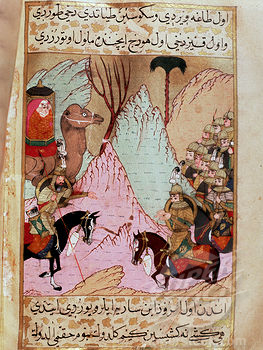Rashidun Caliphate






Rashidun Caliphate
The Rashidun Caliphate (632–661 CE) was the first of the Islamic caliphates to succeed the Islamic prophet Muhammad. It was established after Muhammad's death in 632 (year 11 AH in the Islamic calendar) and lasted until 661 CE. The Rashidun Caliphate is characterized by its rapid expansion, military successes, and significant administrative and cultural developments. The caliphate is often referred to as the "Rightly Guided" or "Righteous" Caliphate, a reflection of the leadership of the first four caliphs: Abu Bakr, Umar ibn al-Khattab, Uthman ibn Affan, and Ali ibn Abi Talib. These leaders are considered rightly guided because they were close companions of Muhammad and played significant roles in the early Islamic community.
Formation[edit]
After the death of Muhammad, the Islamic community (Ummah) faced the challenge of succession. This led to the appointment of Abu Bakr as the first Caliph, initiating the era of the Rashidun Caliphate. Abu Bakr, Umar, Uthman, and Ali's reigns are notable for the compilation of the Quran, the establishment of the Islamic judicial and administrative systems, and the major military expansions that spread Islam beyond the Arabian Peninsula to the Levant, Egypt, parts of the Persian Empire, and North Africa.
Expansion[edit]
The Rashidun Caliphate is known for its military campaigns and expansion. Under the leadership of Umar ibn al-Khattab, the caliphate conquered vast territories in the Middle East, including the Sasanian Empire and significant parts of the Byzantine Empire. These conquests were not only military successes but also led to the spread of Islam and the integration of diverse peoples into the Islamic community.
Administration[edit]
The Rashidun Caliphs established an efficient administrative system that enabled the newly formed state to maintain order and facilitate the integration of conquered territories. This system included the division of the state into provinces or governorates, each under the rule of a governor appointed by the caliph. The caliphate also implemented a judicial system based on Islamic law (Sharia), which was derived from the Quran and the Hadith.
Cultural and Religious Contributions[edit]
The Rashidun Caliphate played a crucial role in the compilation of the Quran, which was completed during the reign of Uthman ibn Affan. This period also saw the establishment of the foundations of Islamic scholarship, including the study of Hadith, Fiqh (Islamic jurisprudence), and Tafsir (Quranic exegesis).
Decline and Succession[edit]
The Rashidun Caliphate came to an end with the assassination of Ali ibn Abi Talib in 661 CE, leading to the establishment of the Umayyad Caliphate. The transition marked the end of the era of the Rightly Guided Caliphs and the beginning of a hereditary system of governance in the Islamic world.
Legacy[edit]
The Rashidun Caliphate's legacy is profound, influencing the political, cultural, and religious landscape of the Islamic world. Its model of leadership, based on the principles of justice, consultation, and community welfare, remains a source of inspiration. The period of the Rashidun Caliphate is often idealized as a golden age of Islam, characterized by righteous leadership and the expansion of Islamic civilization.
Ad. Transform your life with W8MD's Budget GLP-1 injections from $75


W8MD offers a medical weight loss program to lose weight in Philadelphia. Our physician-supervised medical weight loss provides:
- Weight loss injections in NYC (generic and brand names):
- Zepbound / Mounjaro, Wegovy / Ozempic, Saxenda
- Most insurances accepted or discounted self-pay rates. We will obtain insurance prior authorizations if needed.
- Generic GLP1 weight loss injections from $75 for the starting dose.
- Also offer prescription weight loss medications including Phentermine, Qsymia, Diethylpropion, Contrave etc.
NYC weight loss doctor appointmentsNYC weight loss doctor appointments
Start your NYC weight loss journey today at our NYC medical weight loss and Philadelphia medical weight loss clinics.
- Call 718-946-5500 to lose weight in NYC or for medical weight loss in Philadelphia 215-676-2334.
- Tags:NYC medical weight loss, Philadelphia lose weight Zepbound NYC, Budget GLP1 weight loss injections, Wegovy Philadelphia, Wegovy NYC, Philadelphia medical weight loss, Brookly weight loss and Wegovy NYC
|
WikiMD's Wellness Encyclopedia |
| Let Food Be Thy Medicine Medicine Thy Food - Hippocrates |
Medical Disclaimer: WikiMD is not a substitute for professional medical advice. The information on WikiMD is provided as an information resource only, may be incorrect, outdated or misleading, and is not to be used or relied on for any diagnostic or treatment purposes. Please consult your health care provider before making any healthcare decisions or for guidance about a specific medical condition. WikiMD expressly disclaims responsibility, and shall have no liability, for any damages, loss, injury, or liability whatsoever suffered as a result of your reliance on the information contained in this site. By visiting this site you agree to the foregoing terms and conditions, which may from time to time be changed or supplemented by WikiMD. If you do not agree to the foregoing terms and conditions, you should not enter or use this site. See full disclaimer.
Credits:Most images are courtesy of Wikimedia commons, and templates, categories Wikipedia, licensed under CC BY SA or similar.
Translate this page: - East Asian
中文,
日本,
한국어,
South Asian
हिन्दी,
தமிழ்,
తెలుగు,
Urdu,
ಕನ್ನಡ,
Southeast Asian
Indonesian,
Vietnamese,
Thai,
မြန်မာဘာသာ,
বাংলা
European
español,
Deutsch,
français,
Greek,
português do Brasil,
polski,
română,
русский,
Nederlands,
norsk,
svenska,
suomi,
Italian
Middle Eastern & African
عربى,
Turkish,
Persian,
Hebrew,
Afrikaans,
isiZulu,
Kiswahili,
Other
Bulgarian,
Hungarian,
Czech,
Swedish,
മലയാളം,
मराठी,
ਪੰਜਾਬੀ,
ગુજરાતી,
Portuguese,
Ukrainian
